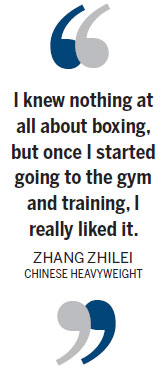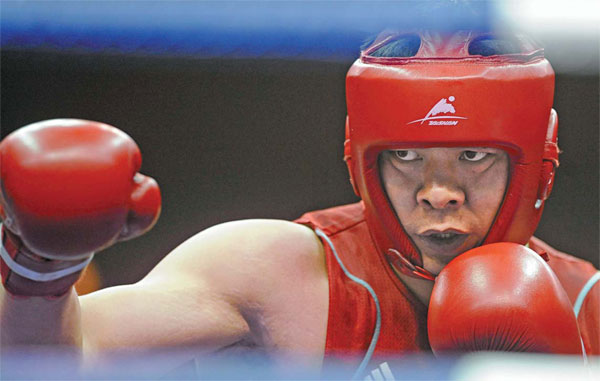Zhang out to prove China's big bang theory
Updated: 2014-11-21 12:26
By Murray Greig(China Daily)
|
|||||||||||
The Olympic medalist from Henan is just one of the talents emerging in Chinese boxing
The way Dino Duva figures it, the next great power surge in global boxing will be supplied by China's Zhang Zhilei, the silver medalist in the super heavyweight division at the 2008 Beijing Olympics.
And the American trainer-turned-promoter knows of what he speaks, having worked with some of the best big men in ring history including George Foreman, Evander Holyfield and Lennox Lewis.
The irony is that the 6-foot-6, 260-pound Zhang would not be getting the opportunity had he been a less cumbersome canoeist as a teenager. The 31-year-old southpaw from Zhoukou, Henan province, first entered the ring at 14 after gaining too much weight to properly pilot a racing canoe - his first athletic love.
"I knew nothing at all about boxing, but once I started going to the gym and training, I really liked it," Zhang says through an interpreter after signing a pro contract with Duva's New York-based Dynasty Boxing in March.
"I grew up watching videos of Muhammad Ali, Mike Tyson and the Klitschkos," he says, referring to Ukrainian brothers Wladimir and Vitali, who have ruled boxing's showcase division for the past 15 years.
"I hope I can be like them and win a golden belt someday, too. In amateur the fights are short and points mean everything. You fight a couple of different bouts in a tournament to win the whole thing. Professional boxing is much different. There are more rounds and more strategies, so it's very important to always be in top condition."
That is what Duva is counting on, Zhang's age not withstanding.
"This is a very special big guy who has the whole package: size, athleticism, good looks and great personality. But more important, he knows how to fight. His style is already much more pro than amateur," Duva says.
"He was on our radar for several years, and I believe that once fans get a look at him, he will be the talk of the heavyweight division. I would describe him as a boxer-puncher with good power and nice footwork. I believe he's the most important big man to hit boxing since the Klitschkos turned pro in 1996."
Duva got to know Zhang and his Olympic roommate, Zou Shiming, during a series of training camps he helped organize for China's national team, starting in 2009. He waited for Zhang to end his amateur career in 2012 before applying through government channels to turn him pro.
"We waited a long time for this moment... the first fight of what could turn out to be a very historic boxer's pro career," Duva says.
"Zhang's goal is to become the first Chinese heavyweight champion of the world. I feel he has the potential, but it's going to be a learning process that will take much hard work and dedication on his part."
Zhang, who lives and trains in New Jersey, made his pro debut on Aug 8 in Fallon, Nevada, needing just 17 seconds to knock out American trial horse Curtis Tate, who went into the fight with a record of 7-4, including six victories by KO.
Four-time world champion Holyfield, who has been retained by Duva as an adviser, led the Chinese fighter into the ring.
"We feel that Zhang has the heart, the size and everything else that's necessary to win the title," Holyfield told boxingscene.com. "The honest thing you have to tell him is that he has to really want it. If he wants to be a champion, he will be. If he does all the right things, there's no reason he won't be successful."
Zhang vows to be an apt student. "I believe I will make a lot of progress quickly, and I will learn a lot from Evander, both mentally and physically," he says. "I watched his fights growing up, and they really inspired my dream to become a fighter like him."
While conceding it is far too early to plot a realistic timeline, Duva believes Zhang could be in a position to challenge for a championship title within two years.
"The big guys are different than boxers in lower weight divisions," Duva says. "They don't have to fight as often, for one thing. I think if he stays healthy and keeps winning, Zhang could be ready for a title shot after 12 or 14 fights.
"And this is just the start. It is my sincere pleasure to be working with a very special Chinese boxer, and as we go forward we will be looking to promote other Chinese fighters and help develop the sport in what is becoming the hottest boxing market in the world."
While Zhang and double Olympic gold medalist Zou Shiming have the highest profile among Chinese boxers on the international stage, a trio of compatriots is not far behind.
Both Dalian super lightweight Ik Yang and Hong Kong bantamweight Rex Tso continued their impressive rises with spectacular knockout wins on a Macao card headlined by Zou in July, while Kunming's Xiong Chaozhong is ranked No 5 in the world at strawweight.
Yang improved to 16-0 with a third-round stoppage of Thailand's Rachamonkol Pleonchit, while Tso moved to 14-0 by starching Indonesia's John Dajawa in five.
Along with Xiong, who dropped a unanimous decision to South Africa's Hekkie Budler for the World Boxing Organization and International Boxing Federation 105-lbs titles in Monaco last month, the B-list of Chinese boxers is rapidly gaining global notice.
Xiong, a former miner, became China's first professional world champion in October 2012 by beating Mexico's Javier Martinez for the World Boxing Council crown, then lost it to another Mexican, Oswaldo Novoa, last February.
"From the moment I first stepped into the ring to fight, I knew I was fulfilling my life's work. I was very honored to be China's first champion, and I won't rest until I wear that belt again," Xiong says.
The enthusiasm and dedication of this new generation of Chinese boxers is even more impressive when you consider that in 1959 the sport was officially banned in the country for being too Western and too violent.
And considering the championship aspirations of these young men, it seems only fitting that China's great leap forward to becoming a global hotbed of professional pugilism was ignited by none other than the self-proclaimed "greatest of all time" just 35 years ago.
In an extension of Richard Nixon's ping-pong diplomacy that heralded the opening up of New China a few years earlier, in December of 1979, three-time world heavyweight champion Muhammad Ali visited Beijing at the personal behest of the late top leader Deng Xiaoping.
The diminutive leader and the towering, iconic champ met privately to discuss how boxing could become a catalyst in the push by both sides for better understanding and cooperation between China and the United States.
In ring parlance, it might have been Nixon who threw the first tentative jab at thawing Sino-US relations when he visited China in 1972, but it was up to Ali to deliver the knockout punch seven years later, paving the way, along with China's leaders, for the professionals who carry China's hopes today.
murraygreig@chinadaily.com.cn

|
Boxing insiders believe heavyweight Zhang Zhilei could be in position to challenge for a championship title within two years. Xiao Yijiu / Xinhua |
(China Daily 11/21/2014 page9)
Today's Top News
China wants its voice heard in cyberspace
New standards set for air purifiers
Alipay brings the frenzy of Black Friday to China
US violates China sovereignty in HK
Cyber terrorism sparks Internet debate
Editorial: Mob politics rocks HK
UnionPay offers discounts to outbound tourists
Palace Museum opens door to special groups for free
Hot Topics
Lunar probe , China growth forecasts, Emission rules get tougher, China seen through 'colored lens', International board,
Editor's Picks

|

|

|

|

|

|






